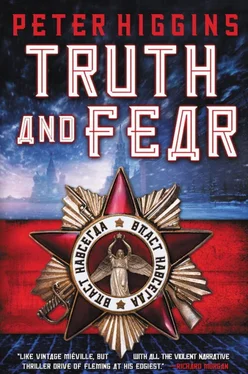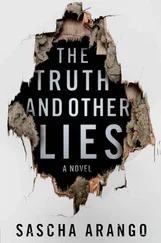‘How did you get in here?’ said Iliodor. It struck him, even as he spoke, that this wasn’t the most urgent, nor the most rational, of all the questions he might have asked.
‘I’m afraid,’ said the intruder with Iliodor’s face, ‘what with the bombs and all, security was rather cursory in the matter of credentials. A familiar appearance…’
He spoke with a cultured, almost diffident voice that resembled Iliodor’s own but was not, Iliodor thought, the same. There was a deepness, a throaty undertone, that struck him as odd. His neck was thicker than Iliodor’s own, and roped with muscle under the skin. There were flecks of tawny amber in the green of his eyes.
‘And of course,’ the mirror-Iliodor continued, ‘by the same token, given the destruction wrought across the city, one more unidentifiable body found in the street will be unlikely to cause much excitement.’
Only then did Iliodor notice the large kitbag in the intruder’s hand, which was obviously empty.
‘Oh…’ said Iliodor. ‘No.’ There was an emptiness in his stomach. An unhealable sadness. ‘No. You don’t have to…’
The face watching him was raw. Gold-flecked eyes looked into his, dark almost to tears, reflecting Iliodor’s own hopeless sadness back at him, distilled and magnified.
‘But I am a soldier,’ said the man who was not Iliodor. ‘And this is a war.’
After Fohn’s broadcast, Lom and Maroussia went back down with Elena Cornelius and her girls to their apartment. The air-raid sirens were wailing again in the distance. They could hear the muffled crump of falling bombs.
‘I’m afraid you’re stuck with us,’ said Maroussia. ‘For tonight.’
‘It doesn’t matter,’ said Elena. ‘No. I’m glad.’
The two of them, Elena and Maroussia, made a soup. Cabbage. An onion. Kvass. While they worked, Lom picked up the newspaper that Elena had brought with her from the Count’s room. He skimmed idly through the account of the attack on General Secretary Dukhonin’s house: the brave defence mounted by his guards and a passing militia patrol; the fall of Dukhonin himself in the struggle; the death of the firebrand convict Josef Kantor and all of his murderous gangster squad.
Lom read and reread the sentence. It didn’t change. Kantor was dead. He had led the attack on Dukhonin and died in the ensuing gun battle.
Kantor was dead.
He read the story to the end. Chazia had made a speech about a renewed determination to rid Mirgorod and the Vlast of the disease of anarchic nationalist terrorism and those who harboured it. There was nothing more about Kantor. In the rest of the paper there was almost no mention of the war and the enemy coming towards the city. It might have been news from a year ago. A decade. Except that Kantor was dead.
Lom sat and nursed the news of Kantor’s death like a wound. This was new disaster. Lom’s thread into the Lodka; his plan–if it was ever a plan, not just a half-baked impossibility–was shredded. He would have to start working at it all over again. And war was come. The city burning.
‘Maroussia?’ he said at last.
‘Yes?’
‘You should see this.’ He held the newspaper towards her, folded open at the page. Watched her read it twice.
‘Oh,’ she said. ‘OK. So that’s that.’ She put the paper down and started laying the table.
When they had finished eating and Lom had helped the girls clear away, Elena Cornelius brought out a box and put it on the table. It was made of a reddish fibrous wood, heavy and roughly made, the size of a large book, with a tight-fitting lid. The lid was covered with carvings of leaves and intertwined curling thorny stems.
‘I’ve been saving these,’ she said. ‘I brought them with me when I came to the city. I want to have them now.’
She took off the lid. Inside was a heap of dark shining fruit. Berries of purple and red. Wild strawberries, blackcurrants, raspberries. Elderberries, night-blue, luminous, as fat and fresh and full as the day they were picked. Other berries Lom didn’t recognise.
‘Here,’ said Elena, offering the box to the girls. ‘These are from the forest. I’ve kept them twenty years. There used to be more. The box was full when I came to Mirgorod. Your father and I had some, when each of you were born.’
Galina hesitated.
‘Go on,’ said Elena. ‘They’re good to eat. I promise.’
‘But… they’re for celebrations.’
‘I want us to have them now.’
When the girls had taken a couple she pushed the box over to Maroussia and Lom.
‘You too. Please.’
Lom took a single elderberry and put it in his mouth. Burst it against his tongue. The fruit was fresh and sharp and sweet, with a slight taint of resin that was not unpleasant but made the juice taste dark and wild and strange.
‘It’s a property of the tree,’ said Elena. ‘It’s a kind of red pine: the breath of the wood keeps things fresh, not for ever, but longer. There was a giant called Akki-Paavo-Perelainen who used to come every autumn to our timber yard. He would always come just before the river froze, riding a great raft of red pine down the river. He gave me this box, and I carved the lid.
‘That was the year my father was accused of crimes of privacy, and they made us leave the yard and the house. We weren’t allowed to take anything with us. Not a thing. Not even our name. They said our family was dissolved. Relations annulled . My father was to be called Feliks Ioannes, my mother was Teodosia Braun, and I was Elena Schmitt. I remember my mother shouting at the official, “She is my daughter. It is a fact of nature. Nothing you say can change it.” And the man was saying to us over and over again, “Your thoughts and your strength belong to the Vlast, just like the rest of us.”
‘They let us carry on living together for a while, in a room above a shop in the town. When we got there it was filthy. Disgusting. Every surface was covered in some kind of sticky grease, and the blankets smelled of illness. The day we moved in my mother set about cleaning it, and my father sat in a chair by the window, smoking, not saying a word. I sneaked away and went back to our old house. I broke in through a window and I just walked from room to room. Just touching things. While I was there some men came, and I had to hide in my bedroom. I heard them in the corridor. One of them pissed on the wallpaper. I heard it splashing on the rug. When I got away from the house I brought this box away with me, the only thing I had left from the old life, and when I came to work in Mirgorod I brought it here. These are the same berries Akki-Paavo-Perelainen gave me. You can’t hang on to things for ever. Let’s finish them now.’
Bez Nichevoi returned to his body at nightrise. He came back into it gradually, curled in its nest of earth and leaves and moss and chewed-over bones high among the roof beams of an empty warehouse in the city. As the planet turned its continent-face slowly away from the sun, the netted nerve-threads of his body snagged the touch of darklight and twitched and quietly sang. The settled sump of its blood unthickened, the secretions of its glands began to seep, interstitial lymph condensed like honeydew and capillaries, deconstricted, stirred. Ligatures of skeletal articulation re-clenched. In the slack pale slubs of jelly in the chambers of its skull, synaptic pathways undissolved. Bez Nichevoi warmed slowly through. And took breath. The body jack-knifed, spasming, choking, retching, vomiting acidic slews of gluey, gobbetty brown stink across its mushroom-pale and bone-thin chest. The waste products of a day of death.
Awakened, he lay back and opened his eyes, drinking in the beautiful darkness like water. The air around him was freezing. His first breaths hung in pale ghosts above his face, slowly dispersing. He surrendered himself to the pleasures of his nest, sweet and warm and crumbly-rotting, matted with perfumed fungal threads. The familiar musty smell of crusted salt and hawthorn blossom, rotting fruit and strong meat. A smell to awaken desire and dark, hidden feelings. Parts of his body were covered with skin-like papery stuff. He picked and peeled it carefully away with his fingernails and ate it.
Читать дальше


![Кэмерон Доки - Правда и ее последствия[Truth and Consequences]](/books/79610/kemeron-doki-pravda-i-ee-posledstviya-truth-and-con-thumb.webp)









